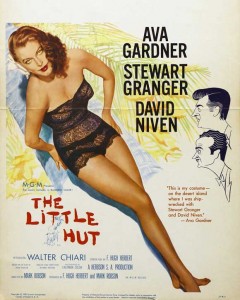On a lark I started watching the classic film The Little Hut, seeing the strong cast, highlighted by Ava Gardner, David Niven (a favorite), and Stewart Granger. What little I did know of the film heading in was of a convoluted love triangle storyline. And the pretense that classic film means a good film.
David Niven plays Henry Brittingham-Brett, a former love of Ava Gardner (playing Lady Susan Ashlow). Susan is married to Henry’s best friend, the estimable Sir Philip Ashlow (Stewart Granger). Susan and Henry have been carrying on a torrid affair for several years right under Philip’s nose- and he is still unsuspecting, to say the least.
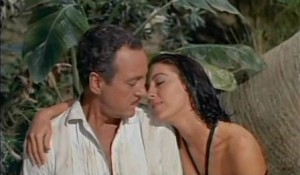 Sir Philip hosts a dinner party cruise on his yacht, which founders- the yacht that is. We find our three stars adrift in a lifeboat and eventually they reach a presumably deserted island. After building a “big house” and a “little hut” there seems little to do. The little hut is originally for the bachelor Henry. Evidently changes of clothes and food are in abundance, so the result is quite a bit of talking.
Sir Philip hosts a dinner party cruise on his yacht, which founders- the yacht that is. We find our three stars adrift in a lifeboat and eventually they reach a presumably deserted island. After building a “big house” and a “little hut” there seems little to do. The little hut is originally for the bachelor Henry. Evidently changes of clothes and food are in abundance, so the result is quite a bit of talking.
Ultimately Henry decides to confess his affair to Philip, who really seems not to care. In fact, he, as a captain (of sorts) deems it his right to decree a divorce, which he does. There is a good amount of witty banter, but unfortunately it really doesn’t seem to go anywhere. Philip is often left a distant third among the three leads, which is unfortunate. His oblivious character is perhaps the most interesting, or perhaps would have been with a bit more attention.
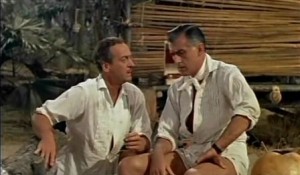 The movie really fails on many levels. The weak sets with their potted plants, obviously tracked animal sounds, and painted landscapes could be overlooked if the plot was simply better or perhaps developed a bit more. It never really goes beyond the stereotypical storyline you’d expect for such a picture. Even the most exciting event in the film – the storm and ultimate sinking of the ship, is a nonstarter.
The movie really fails on many levels. The weak sets with their potted plants, obviously tracked animal sounds, and painted landscapes could be overlooked if the plot was simply better or perhaps developed a bit more. It never really goes beyond the stereotypical storyline you’d expect for such a picture. Even the most exciting event in the film – the storm and ultimate sinking of the ship, is a nonstarter.
For my money, numerous great opportunities were lost in not developing Philip a bit more. He is really a one trick pony with the trick being oblivion to what is going on as he is so work oriented- a workaholic if you will. (It’s he who builds the houses on the island.) Comedywise, many of the jokes are perhaps a bit cruel, although some are witty and effective.
The Little Hut itself is only in about the last third of the film so perhaps a better title would have been Path to the Little Hut or something similar. Basically the little hut equates symbolically to the odd man out or “third wheel” although neither David Niven nor Stewart Granger seem to mind having the hut for themselves. And to my eye it did look to be closer to the beach, but again I’ve never been a castaway so perhaps that isn’t a plus at all.
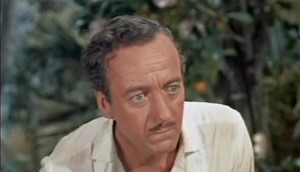 In another great taste of ‘what could have been.’ It is odd to look back and see movies which, on paper, should have been strong performers- but instead were flops. MGM opted to put more credence in the success of the play which The Little Hut was based on in the play’s record in London, where it was quite a hit. Unfortunately, they perhaps should have looked more at the lack of success on Broadway, where the same play barely eeked out a one month run.
In another great taste of ‘what could have been.’ It is odd to look back and see movies which, on paper, should have been strong performers- but instead were flops. MGM opted to put more credence in the success of the play which The Little Hut was based on in the play’s record in London, where it was quite a hit. Unfortunately, they perhaps should have looked more at the lack of success on Broadway, where the same play barely eeked out a one month run.
David Niven is still David Niven, which for me is never a bad thing. Dud or not he always delivers a strong performance for my book. It is truly too bad that director Mark Robson couldn’t work up a bit more “heat” on screen, but again I don’t know the constraints he may have been under at the time. Production values are severely limited as for a desert island environment, the picture is extremely setbound, betraying its stage origins.
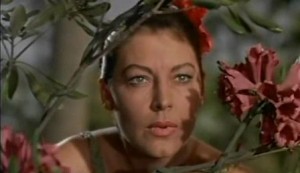 Gardner is at her finest, although the material given to work with was obviously minimal. She, like the rest of the cast, manages to make a go at it but the results are still miserable. Again given the ready access of exquisite gowns on this island she couldn’t look better.
Gardner is at her finest, although the material given to work with was obviously minimal. She, like the rest of the cast, manages to make a go at it but the results are still miserable. Again given the ready access of exquisite gowns on this island she couldn’t look better.
Sad to say this is one that perhaps is avoided or relegated to ‘guilty pleasure’ status. It isn’t overtly bad but -more maddeningly dull- you can see even today and with your 1950s goggles on why it failed. It is a story of missed opportunities.
This one hasn’t been released in any format so sneak a viewing on TCM if you can.
